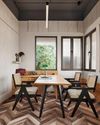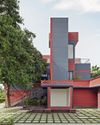
My first encounter with architects Shreenu and Ranjeet Mukherjee’s work was a private residence located in rural Maharashtra. This residence set in an organic farm—11 acres of undulating land with steep contours and terraces—was for me, an epitome of sustainable architecture. Sustainability, for Ranjeet and Shreenu, goes way beyond just mimicking the topography. Their approach to design is calm, measured and deeply spiritual. Another project that piqued our interest was the renovation of a heritage property in Mussoorie. Apparently, this house was the second structure built during the inception of Mussoorie as a hill station by the British Empire. “The process took us four years. We were acutely aware of how insignificant the time and effort taken towards conservation actually was, when compared to the age and majesty of this house. Understanding that we were merely participants, in the complex and layered evolution of this structure for over a century, was key,” elucidates Ranjeet, as he talks about the Holmwood conservation project.
What we decipher from each of their projects is that their involvement with design is not merely superficial; it goes beyond the limitations of the physical realm. “We occupy a realm where, to the best of our analytical capacities, it is found that regardless of how finely we divide space or take matter apart, there seems to be no end in sight. The deeper we go, the farther any ‘fundamental’ unit seems to get, as complexity and depth within every quantum of space, apparently infinite. Similarly, we appear in a universe infinitely large, now seen to be composed of building blocks, that are in turn infinitely small… and humanity stands on the knife edge, as some scalar median.” It is perhaps this realisation that brings a certain humility to all their designs.
Bu hikaye Architecture + Design dergisinin July 2023 sayısından alınmıştır.
Start your 7-day Magzter GOLD free trial to access thousands of curated premium stories, and 9,000+ magazines and newspapers.
Already a subscriber ? Giriş Yap
Bu hikaye Architecture + Design dergisinin July 2023 sayısından alınmıştır.
Start your 7-day Magzter GOLD free trial to access thousands of curated premium stories, and 9,000+ magazines and newspapers.
Already a subscriber? Giriş Yap

A GRECIAN RETREAT
Shimona Bhansali imbues a subtle touch of opulence to this home in Mumbai

A BOLD STATEMENT
Dhampur Sugar Mills Limited's workspace in New Delhi designed and built by Officebanao adopts an industrial narrative

A BREATH OF FRAGRANT DESIGN IN DELHI'S HEART
An office that smells like perfumery; that is the vision that TWI brought to life in this office space designed for an acclaimed perfume company in India

MASTER OF ALL TRADES
The ethos of forward-thinking and ingenuity finds its architectural counterpart within the walls of Nikhil Kamath and Abhijeet Pai's office-a vision of organic design infused with the essence of India

A TOUCH OF OPULENCE
Designed by Aparna Kaushik, this Delhi office displays an interesting balance of classic aesthetics and contemporary sensibilities

THE WOODEN WONDERLAND
Priyanka and Piyush Mehra envision a stunning experience centre for Vikas Plywood

THE HUB: BUILDING COMMUNITIES
Studio Lotus designs a dynamic mixed-use community hub that activates Chennai's largest IT Park

THE WINNER'S PERCH
Baldiwala Edge designs a Singapore-based ship broker's office as a torch collector's paradise, offering a 360-degree bird's-eye view of the Mumbai skyline

THE DIRECTOR'S CABIN
Designed by Envisage, this office gives a new definition to the traditional notion of biophilia

Designing Corporate India
From weaving the magic of a Star Trek-themed command centre to crafting bespoke block-printed workstations, Vijaya Bhargav and Arnab Ghosh-the trailblazing co-founders of Ostraca-have astonishingly transformed a staggering 29 million square feet of office space for India's tech giants and global enterprises-all while maintaining a flat hierarchical company culture-fuelling a master class in corporate design